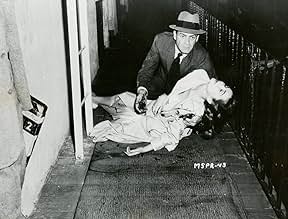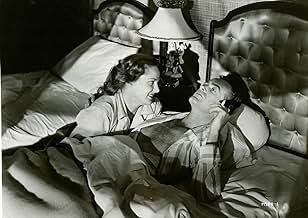IMDb रेटिंग
6.6/10
1 हज़ार
आपकी रेटिंग
अपनी भाषा में प्लॉट जोड़ेंIn Arizona, a train's baggage car is robbed of a large payroll, prompting an investigation led by a railroad official-insurance investigator team.In Arizona, a train's baggage car is robbed of a large payroll, prompting an investigation led by a railroad official-insurance investigator team.In Arizona, a train's baggage car is robbed of a large payroll, prompting an investigation led by a railroad official-insurance investigator team.
Rodolfo Hoyos Jr.
- Lt. Castro
- (as Rudolpho Hoyos)
Robert Anderson
- Sheriff Jack of Winston
- (बिना क्रेडिट के)
Raymond Bailey
- Sam Hendricks
- (बिना क्रेडिट के)
Art Balinger
- Jail Officer
- (बिना क्रेडिट के)
Howard Culver
- Pete the detective
- (बिना क्रेडिट के)
Roy Glenn
- Train Porter
- (बिना क्रेडिट के)
William Kendis
- Eddie, baggage handler
- (बिना क्रेडिट के)
John Maxwell
- Train Conductor
- (बिना क्रेडिट के)
Anna Navarro
- Mexican Bar Fly
- (बिना क्रेडिट के)
फ़ीचर्ड समीक्षाएं
After robbers steal $50,000 from a train, an insurance investigator (Mark Stevens) is assigned to investigate, who in fact one of the ring leaders of the train robbery and needs to make the investigation seem credible.
Produced, directed by and starring Stevens, this is an interestingly plotted crime thriller written by Aben Kendel that contains plenty of twists and turns with some decent changes in direction with Stevens' character trying to double cross his co-thieves.
Produced, directed by and starring Stevens, this is an interestingly plotted crime thriller written by Aben Kendel that contains plenty of twists and turns with some decent changes in direction with Stevens' character trying to double cross his co-thieves.
This is a neat, no-frills thriller about an intricately planned train heist, the turbulent insurance investigator assigned to the case, and his hard-nosed boss whose motto is "There's no such thing as a perfect crime." Filmed in the flat, greyish TV style of the 50s with occasional expressionist touches, it is rife with plot twists and intriguing characters, and features a supporting cast of familiar faces (Alan Reed, Jack Klugman, etc). It should appeal to those who prefer story over stylishness. Tough-guy Stevens starred in several top-notch noirs of the 40s, and directed a couple of good second-feature thrillers in the 50s, including Cry Vengeance.
Gang executes intricate train robbery, putting two insurance investigators on their trail, with a major twist.
At about the time Kubrick was making a reputation with his heist film The Killing (1956), Mark Stevens put together this little gem. Unlike Kubrick's classic, this caper film doesn't rise to semi-artistic heights, but it is tight, tough, and well-acted, with some nice touches. For example, there're the surly baggage handler and the brusque airplane mechanic, both colorful bits that could have easily remained routine.
Aben Kandel's script is carefully plotted, dribbling out pieces of information that keep us glued to developments-- plus that great opening hook with its careful staging. But what I especially like is his and Stevens' attention to jilted wife Ruth (Stewart). It would have been so easy to shove this plain-faced woman aside as Stevens cavorts with the lovely Linda (Farr). Instead they play up her heartbreak as this drably devoted wife watches the collapse of everything she holds dear. In my book, it's a sensitive dimension that helps lift this 80- minutes beyond the simply well-crafted.
In addition to Stewart's fine performance is King Calder's (Armstong). His humorless, Bassett hound face is perfect for the dogged investigator who knows the importance of visualizing and goes where the evidence takes him, regardless. Look too for Jack Klugman (Frankie) in one of his earliest film roles.
Judging from Stevens' list of credits (IMDB), he's one of those contract players trying his best after the break up of the old studio system and the decline of the B-movie. Whatever his later misfortunes (Gunsight Ridge {1957}; Gun Fever {1958})-- he and Kandel team up to score solidly with this overlooked little caper gem.
At about the time Kubrick was making a reputation with his heist film The Killing (1956), Mark Stevens put together this little gem. Unlike Kubrick's classic, this caper film doesn't rise to semi-artistic heights, but it is tight, tough, and well-acted, with some nice touches. For example, there're the surly baggage handler and the brusque airplane mechanic, both colorful bits that could have easily remained routine.
Aben Kandel's script is carefully plotted, dribbling out pieces of information that keep us glued to developments-- plus that great opening hook with its careful staging. But what I especially like is his and Stevens' attention to jilted wife Ruth (Stewart). It would have been so easy to shove this plain-faced woman aside as Stevens cavorts with the lovely Linda (Farr). Instead they play up her heartbreak as this drably devoted wife watches the collapse of everything she holds dear. In my book, it's a sensitive dimension that helps lift this 80- minutes beyond the simply well-crafted.
In addition to Stewart's fine performance is King Calder's (Armstong). His humorless, Bassett hound face is perfect for the dogged investigator who knows the importance of visualizing and goes where the evidence takes him, regardless. Look too for Jack Klugman (Frankie) in one of his earliest film roles.
Judging from Stevens' list of credits (IMDB), he's one of those contract players trying his best after the break up of the old studio system and the decline of the B-movie. Whatever his later misfortunes (Gunsight Ridge {1957}; Gun Fever {1958})-- he and Kandel team up to score solidly with this overlooked little caper gem.
It's remarkable how many actors from the Golden Age of Hollywood began or ended their careers making crime pictures ( or horror movies). Mark Stevens is a case in point. He began promisingly enough with the stylish noir The Dark Corner in 1946 and basically ended it with Timetable ten years later. Was he a classic Marlowesque private eye in the first one, in Timetable the rigors of maintaining a Hollywood career have visibly and morally taken their toll. Directed by Stevens himself, all the glamour of the classic noir is drained from both the look of the film as from the protagonists. Stevens has the look of a man who has seen too much and has basically given up hope that his life will change for the better. Even his last desperate attempt to turn his life around seems doomed from the start. Which is not helped by the strict moral code of the day that is constantly underlined, namely that Crime Doesn't Pay. The plot is a little convoluted, but then that's not what we watch these movies for. Stylistically it has little going for it,and small effort was made to avoid a stage-bound look. But the performances are adequate enough and especially Stevens is totally convincing as the world-weary protagonist. For noir fans this one is certainly worth a look.
"Time Table" is a rather forgotten crime film which was directed by and stars Mark Stevens—a very capable but mostly forgotten actor from the 50s and 60s. It's really a shame the film isn't seen and lauded, as it's quite good—especially since it has a very modest budget. I've never seen it on TV nor DVD but fortunately it IS in the public domain and is therefore available through archive.org—a website often linked to films on IMDb. Download a free copy and watch it—it's quite good.
The film starts off wonderfully—with one of the most intelligently filmed heists I can remember. You really need to see it—and I don't want to spoil it by saying more about this. In the next scene, a couple are talking about their upcoming and much-needed vacation to Mexico when the phone rings—the husband (Stevens) is needed at once. It seems he's an investigator for the insurance company covering the heist—and they want him to look into it ASAP. This means the vacation is on hold.
When the investigation begins, it's quite obvious that the crime was very, very professional and was carried out with attention to every detail. However, during the robbery, somehow one of the gang was injured—and this might be the lead they need to break the case. But, in a WONDERFUL twist, the audience soon learns that there is so much more to the story than anyone has anticipated and the identity of the big brains of the operation is quite the surprise. I'd say more but don't want to spoil it.
Some might consider this film to be an example of Film Noir. Well, it is a crime film from the 1950s and is pretty unflinchingly violent in places. However, the film lacks the snappy dialog and cinematography you'd expect for Noir. I personally like the way the movie was handled, as it seemed more realistic than Noir—like you were watching a real investigation unfold. Fascinating throughout.
The film starts off wonderfully—with one of the most intelligently filmed heists I can remember. You really need to see it—and I don't want to spoil it by saying more about this. In the next scene, a couple are talking about their upcoming and much-needed vacation to Mexico when the phone rings—the husband (Stevens) is needed at once. It seems he's an investigator for the insurance company covering the heist—and they want him to look into it ASAP. This means the vacation is on hold.
When the investigation begins, it's quite obvious that the crime was very, very professional and was carried out with attention to every detail. However, during the robbery, somehow one of the gang was injured—and this might be the lead they need to break the case. But, in a WONDERFUL twist, the audience soon learns that there is so much more to the story than anyone has anticipated and the identity of the big brains of the operation is quite the surprise. I'd say more but don't want to spoil it.
Some might consider this film to be an example of Film Noir. Well, it is a crime film from the 1950s and is pretty unflinchingly violent in places. However, the film lacks the snappy dialog and cinematography you'd expect for Noir. I personally like the way the movie was handled, as it seemed more realistic than Noir—like you were watching a real investigation unfold. Fascinating throughout.
क्या आपको पता है
- ट्रिवियाThe $500,000 payroll stolen would be the equivalent of $4,400,000 in 2016.
- गूफ़In the robbery, Dr. Paul Brucker removes three small cash bags from the safe and puts them in his suitcase. But the heist was $500,000 in small bills. Even all new $20 bills wrapped and stacked together would make a pile more than nine feet high. With mixed used small bills ($5 to $20) that couldn't be traced, it would take a large suitcase to handle the money. And, it would weigh at least 60 pounds.
- भाव
Joe Armstrong: There's no such thing as a perfect crime. Just a lucky one. But their luck will run out.
- कनेक्शनFeatured in The World Famous Kid Detective (2014)
टॉप पसंद
रेटिंग देने के लिए साइन-इन करें और वैयक्तिकृत सुझावों के लिए वॉचलिस्ट करें
- How long is Time Table?Alexa द्वारा संचालित
विवरण
- रिलीज़ की तारीख़
- कंट्री ऑफ़ ओरिजिन
- आधिकारिक साइट
- भाषा
- इस रूप में भी जाना जाता है
- Timetable
- फ़िल्माने की जगहें
- उत्पादन कंपनी
- IMDbPro पर और कंपनी क्रेडिट देखें
- चलने की अवधि1 घंटा 20 मिनट
- रंग
- पक्ष अनुपात
- 1.37 : 1
इस पेज में योगदान दें
किसी बदलाव का सुझाव दें या अनुपलब्ध कॉन्टेंट जोड़ें






































